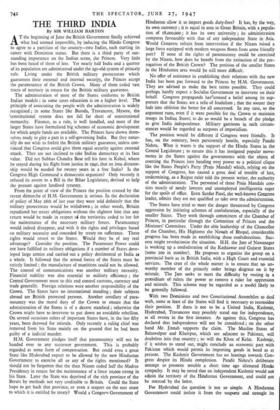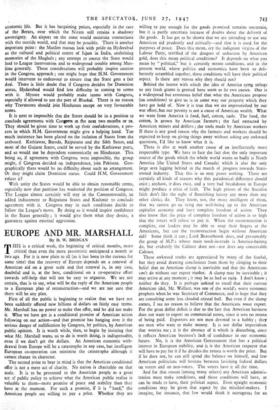THE THIRD INDIA
By SIR WILLIAM BARTON
AT the beginning of June the British Government finally achieved what had seemed impossible, by inducing the Hindu Congress to agree to a partition of the country—two Indias, each starting its career with Dominion status. But there is a third party of out- standing importance on the Indian scene, the Princes. Very little has been heard of them of late. Yet nearly half India and a quarter of its population are administered under the age-old system of princely rule. Living under the British military protectorate which guarantees their external and internal security, the Princes accept the paramountcy of the British Crown. Many of them ceded vast tracts of territory in return for the British military guarantee.
The administration of most of the States conforms to British Indian models ; in some cases education is on a higher level. The principle of associating the people with the administration is widely recognised ; in some States like Baroda, Travancore, Mysore, the *constitutional system does not fall far short of constitutional monarchy. Finance, as a rule, is well handled, and most of the larger States have formulated big schemes of economic development for which ample- funds are available. The Princes have shown them- selves ready to play a part in a self-governing India. But they natur- ally do not wish to forfeit the British military guarantee, unless con- vinced that Congress could give them equal security against external attack. They are not inclined to take Indian democracy at its face value. Did not Subhas Chandra Bose tell his host in Kabul, where he stayed during his flight from justice in 1941, that an iron dictator- ship would be needed for twenty years in a free India? Is the Congress High Command a democratic organism? Only recently it refused its assent to a Bill in the Bihar Legislature, devised to help the peasant against landlord tyranny.
From the point of view of the Princes the position created by the recent demarche of H.M. Government is serious. In the declaration of policy of May 26th of last year they were told definitely that the military protectorate would be withdrawn ; in other words, Britain repudiated her treaty obligations without the slightest hint that any return would be made in respect oi the territories ceded to her for the maintenance of the necessary military forces. Paramountcy would indeed disappear, and with it the rights and privileges based on military necessity and conceded by treaty on sufferance. These rights would revert to the States. Would they be of any real advantage? Consider the position. The Paramount Power could not have fulfilled its military obligations if a number of States deve- loped large armies and carried out a policy detrimental to India as a whole. It followed that the armed forces of the States must be strictly limited ; the manufacture of muniticns could not be allowed. The control of communications was another military necessity. Financial stability was also essential to military efficiency ; the Central Government must to this end control customs, currency and trade generally. Foreign relations were another responsibility of the Crown. The States have no international standing ; their subjects abroad are British protected persons. Another corollary of para- mountcy was the moral duty of the Crown to ensure that the administration of the States is of a decent standard ; otherwise the Crown might have to intervene to put down an avoidable rebellion. On several occasions rulers of important States have, in the last fifty years, been deposed for misrule. Only recently a ruling chief was removed from his State mainly on the ground that he had been guilty of a judicial murder.
H.M. Government pledges itself that paramountcy will not be handed over to any successor government. This is probably regarded as some form of compensation. But could even a great State like Hyderabad expect to be allowed by the new Hindustan Government to exercise all or any of the rights mentioned? It should not be forgotten that the then Nizam ceded half the Madras Presidency in return for the maintenance of a force to,000 strong in his State. Later the State was deprived of the rich province of the Berars by methods not very creditable to Britain. Could the State hope to get back that province, or even a seaport on the east coast to which it is entitled by treaty? Would a Congress Government of Hindustan allow it to import goods duty-free? It has, by the way, its own currency ; it is equal in area to Great Britain, with a popula- tion of 18,000,000 ; it has its own university ; its administration compares favourably with that of any independent State in Asia. Would Congress refrain from intervention if the Nizam raised a large force equipped with modern weapons flown from some friendly port? If none of the rights of paramountcy could be exercised by the Nizam, how does he benefit from the extinction of the pre- rogatives of the British Crown? The position of the smaller States in the Hindustan area would be still more difficult.
No offer of assistance in establishing their relations with the new India has been put forward to the Princes by H.M. Government. They are advised to make the best terms possible. They could perhaps hardly expect a Socialist Government to intervene on their behalf. Congress propaganda has'created a belief among its sup- porters that the States are a relic of feudalism ; that the sooner they fade into oblivion the better for all concerned. In any case, so the argument runs, even if it were possible for the Crown to maintain troops in Indian States; to do so would be a breach of the pledge to give India independence. Military garrisons in such circum- stances would be regarded as outposts of imperialism.
The position would be different if Congress were friendly. It has, on the contrary, been persistently hostile, especially Pandit Nehru. What it wants is the support of the Hindu States in the Central Legislature ; to ensure this it has instigated popular move- ments in the States against the governments with the object of coercing the Princes into handing over power to a political clique like the States People's Party (Praja Mandal) which, relying on the support of Congress, has caused a great deal of trouble of late, undermining, as a Rajput ruler told the present writer, the authority of the administration. The personnel of these Praia Mandals con- sists mostly of needy lawyers ansi unemployed intelligentsia eager for the spoils of office. Even Sardar Patel, the well-known Congress leader, admits they are not qualified to take over the administration.
The States have tried to meet the danger threatened by Congress aggression by initiating schemes of confederation, especially of the smaller States. They work through committees of the Chamber of Princes, in particular through the Committee of Princes and the Ministers' Committee. Under the able leadership of the Chancellor of the Chamber, His Highness the Nawab of Bhopal, considerable progress has been made in establishing these confederations. Suc- cess might revolutionise the situation. H.H. the Jam of Nawanagar is working up a confederation of the Kathiawar and Gujarat States (some 200 in number). He proposes to organise the group on a provincial basis as in British India, with a High Court and essential services. The crux of the whole matter is to ensure that ho un- worthy member of the princely order brings disgrace on it by misrule. The Jam seeks to meet the difficulty by vesting in a praesidium of rulers the power to remove a ruler for oppression and misrule. This scheme may be regarded as a model likely to be generally followed.
With two Dominions and two Constitutional Assemblies to deal with, some at least of the States will find it necessary to reconsider their position. If there is not to be a United India, Kashmir, Hyderabad, Travancore may possibly stand out for independence, at all events in the first instance. As against this, Congress has declared that independence will not be considered ; on the other hand Mr. Jinnah supports the claim. The Muslim States of Bahawalpur and Khairpur, which are adjacent to Pakistan, will doubtless join that country ; so will the Khan of Kelat. Kashmir, if it wishes to stand out, might conclude an economic pact with Pakistan which would permit its importing goods in bond as at present. The Kashmir Government has no leanings towards Con- gress despite its Hindu complexion. Pandit Nehru's deliberate attempt to promote trouble a short time ago alienated Hindu sympathy. It may be noted that an independent Kashmir would not adjoin the territory of the Hindustan Government, and could not be coerced by the latter.
For Hyderabad the question is not so simple. A Hindustan Government could isolate it from the seaports and strangle its
economic life. But it has bargaining points, especially in the case of the Berars, over which the Nizam still retains a shadowy sovereignty. An airport on the coast would maintain connections with the outside world, and that may be possible. There is another important point: the Muslim masses look with pride on Hyderabad as the cultural and political centre of Islam in India, enshrining memories of the Mughals ; any attempt to coerce the State would lead to League intervention and to widespread trouble among Mus- lims generally. These considerations will probably inspire caution in the Congress approach ; one might hope that H.M. Government would intervene to endeavour to ensure that the State gets a fair deal. There is little doubt that if Congress decides for Dominion status, Hyderabad would find less difficulty in coming to terms with it. Mysore would probably make terms with Congress, especially if allowed to use the port of Bhatkal. There is no reason why Travancore should join Hindustan except on very favourable terms.
It is next to impossible that the States should be in a position to conclude agreements with Congress m the next two months or so. They should be given time to work up their confederations, a pro-. cess in which H.M. Government might give a helping hand. Too much insistence has been placed on the isolation of States from the seaboard. Kathiawar, Baroda, Rajputana and the Sikh States, and most of the Gujarat States, could be served by the Kathiawar ports, and so would not be dependent economically on Hindustan. This being so, if agreement with Congress were impossible, the group might, if Congress decided on independence, join Pakistan. Geo- graphically there would be no difficulty about such an arrangement. Or they might claim, Dominion status. Could H.M. Government refuse it?
With unity the States would be able to obtain reasonable terms, especially now that partition has weakened the position of Congress. The League almost certainly will stay in the Commonwealth, an added inducement to Rajputana States and Kashmir to conclude agreement with it. Congress may in such conditions decide to follow the League's move. By doing so it would inspire confidence in the States generally ; it would give them what they desire, a guarantee against external aggression.



































 Previous page
Previous page